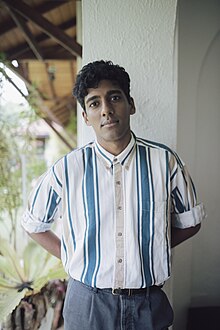The Sri Lanka Portal Sri Lanka, historically known as Ceylon and officially the Democratic Socialist Republic of Sri Lanka, is an island country in South Asia. It lies in the Indian Ocean, southwest of the Bay of Bengal, separated from the Indian peninsula by the Gulf of Mannar and the Palk Strait. It shares a maritime border with the Maldives in the southwest and India in the northwest. Sri Lanka has a population of approximately 22 million and is home to many cultures, languages and ethnicities. The Sinhalese people form the majority of the population, followed by the Sri Lankan Tamils, who are the largest minority group and are concentrated in northern Sri Lanka; both groups have played an influential role in the island's history. Other long-established groups include the Moors, Indian Tamils, Burghers, Malays, Chinese, and Vedda. Sri Lanka's documented history goes back 3,000 years, with evidence of prehistoric human settlements dating back 125,000 years. The earliest known Buddhist writings of Sri Lanka, known collectively as the Pāli canon, date to the fourth Buddhist council, which took place in 29 BCE. Also called the Pearl of the Indian Ocean, or the Granary of the East, Sri Lanka's geographic location and deep harbours have made it of great strategic importance, from the earliest days of the ancient Silk Road trade route to today's so-called maritime Silk Road. Because its location made it a major trading hub, it was already known to both East Asians and Europeans as long ago as the Anuradhapura period. During a period of great political crisis in the Kingdom of Kotte, the Portuguese arrived in Sri Lanka and sought to control its maritime trade, with a part of Sri Lanka subsequently becoming a Portuguese possession. After the Sinhalese-Portuguese war, the Dutch Empire and the Kingdom of Kandy took control of those areas. The Dutch possessions were then taken by the British, who later extended their control over the whole island, colonising it from 1815 to 1948. A national movement for political independence arose in the early 20th century, and in 1948, Ceylon became a dominion. It was succeeded by the republic of Sri Lanka in 1972. Sri Lanka's more recent history was marred by a 26-year civil war, which began in 1983 and ended in 2009, when the Sri Lanka Armed Forces defeated the Liberation Tigers of Tamil Eelam. (Full article...) Selected article - The Jaffna kingdom (Tamil: யாழ்ப்பாண அரசு, Sinhala: යාපනය රාජධානිය; 1215–1619 CE), also known as Kingdom of Aryachakravarti, was a historical kingdom of what today is northern Sri Lanka. It came into existence around the town of Jaffna on the Jaffna peninsula and was traditionally thought to have been established after the invasion of Kalinga Magha from Kalinga in India. Established as a powerful force in the north, northeast and west of the island, it eventually became a tribute-paying feudatory of the Pandyan Empire in modern South India in 1258, gaining independence when the last Pandyan ruler of Madurai was defeated and expelled in 1323 by Malik Kafur, the army general of the Delhi Sultanate. For a brief period in the early to mid-14th century it was an ascendant power in the island of Sri Lanka, to which all regional kingdoms accepted subordination. However, the kingdom was overpowered by the rival Kotte kingdom around 1450 when it was invaded by Prince Sapumal under the orders of Parakramabahu VI. It gained independence from Kingdom of Kotte control in 1467, and its subsequent rulers directed their energies towards consolidating its economic potential by maximising revenue from pearls, elephant exports and land revenue. It was less feudal than most of the other regional kingdoms on the island of Sri Lanka of the period. During this period, important local Tamil literature was produced and Hindu temples were built, including an academy for language advancement. The Sinhalese Nampota dated in its present form to the 14th or 15th century CE suggests that the whole of the Jaffna Kingdom, including parts of the modern Trincomalee District, was recognised as a Tamil region by the name Demala-pattanama (Tamil city). In this work, a number of villages that are now situated in the Jaffna, Mullaitivu and Trincomalee districts are mentioned as places in Demala-pattanama. (Full article...)General imagesThe following are images from various Sri Lanka-related articles on Wikipedia.
Related portalsIndian Subcontinent Other countries Selected biography -
Anuk Arudpragasam (Tamil: அனுக் அருட்பிரகாசம்) (born 1988) is a Sri Lankan Tamil novelist writing in English and Tamil. His debut novel The Story of a Brief Marriage was published in 2016 by Flatiron Books/Granta Books and was subsequently translated into French, German, Czech, Mandarin, Dutch and Italian. The novel, which takes place in 2009 during the final stages of the Sri Lankan Civil War, won the DSC Prize for South Asian Literature, and was shortlisted for the Dylan Thomas Prize and the German Internationaler Literaturpreis. His second novel, A Passage North, was published in 2021 and was shortlisted for the Booker Prize. (Full article...)
Did you know (auto-generated)
Selected pictureMore did you know -
TopicsSubcategoriesNew articlesThis list was generated from these rules. Questions and feedback are always welcome! The search is being run daily with the most recent ~14 days of results. Note: Some articles may not be relevant to this project.
Rules | Match log | Results page (for watching) | Last updated: 2024-07-27 22:22 (UTC) Note: The list display can now be customized by each user. See List display personalization for details.
Web resourcesThings you can doWikipedias in Sri Lankan languagesAssociated WikimediaThe following Wikimedia Foundation sister projects provide more on this subject:
Discover Wikipedia using portals |





































































